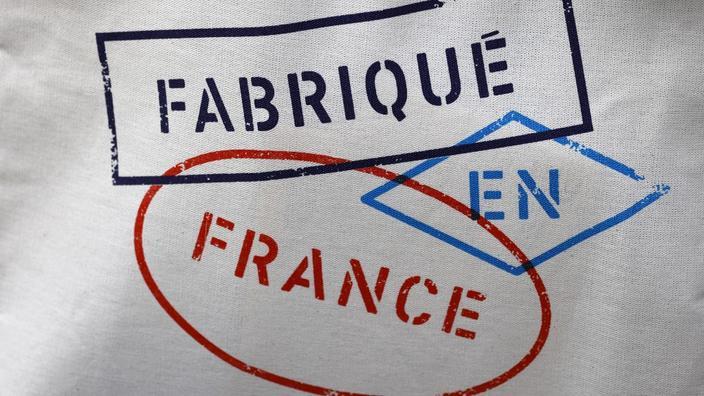Laurent Izard is a normalien and associate of the University in economics and management. He is the author of numerous higher education textbooks in economics and management. He published
La France sold à la coupe
(L'Artilleur) in 2019.
FIGAROVOX. - An article published by France Bleu on the sidelines of Arnaud Montebourg's trip suggested that the Ministry of the Armed Forces would have granted a public contract for sweaters to a Chinese manufacturer to the detriment of a small French company. Information denied by the Army. In reality, the sweaters are made and assembled in Morocco, as the company Léo Minor confirmed to
Marianne
. Is it an admission of failure?
Laurent IZARD. -
We do not know the origin of this rumor, but what is interesting is that this false news was considered credible by many observers. There are reasons for this: the French Army, and most of our Administrations more generally, have developed a globalized vision of public procurement, thus respecting the rules of international and European law. On the contract for sweaters, the spokesperson for the armed forces felt obliged to react and was moreover very clear: “
The competition for this public contract was conducted in accordance with the Code of public procurement, on criteria of quality, price, incorporating social responsibility provisions. The market was built to allow SMEs to apply
”.
Our leaders have long stopped believing in our industrial and financial capacities.
Laurent Izard
The fact remains that for "non-technical" orders, the price criterion remains decisive to the detriment of quality.
And public buyers do not seek to favor French products.
However, in the textile sector, the minute cost of an employee in France is around 50 cents of euros, against 13 cents in Morocco and 5 cents in China.
It is therefore not surprising that foreign companies win numerous calls for tenders by offering low-quality products.
This is not necessarily a good calculation, because it is obviously necessary to take into account the national economic interest, the effectiveness and the durability of the products as criteria of social responsibility.
The European Union has also changed its position in this direction and published in May denier a new edition of its guide on public tenders with social responsibility clauses. In 110 pages, the document covers the issue: strategy to be followed, reconciliation between responsible purchasing and definition of needs, choice of procedure, possibilities offered by the Community legal framework, award criteria, evaluation of bids, without forgetting verification of compliance with contractual clauses. But for the most technical or strategic products, questions of sovereignty and economic independence also arise.
Alongside French players who subcontract abroad, the Ministry of the Armed Forces has also placed orders with companies entirely based outside France in recent years. In July 2019, for example, a Bulgarian company won a tender for 43 million euros, to ship “short-sleeved shirts” to France. How do you see this choice? Should the Ministry of the Armed Forces place orders exclusively with French companies?
Unfortunately, there are many other examples that could be cited.
I used a few of them in my book
La France sold à la coupe
: thus, no French company was able to respond to the calls for tenders launched by the government in 2013 to replace the old FAMAS rifles. The Manufacture d'Armes de Saint-Étienne, which produced them, in fact closed its doors for good in 2001, due to a lack of orders, after being taken over by GIAT Industries in 1989. Several foreign companies (German, Belgian, Croatian, American and Italian) have candidate, demonstrating that the small arms industry was far from dying. We finally accepted the offer of the German Heckler & Koch GmbH, which will equip our land forces for several decades. This choice of a foreign supplier is not surprising because we have already equipped our law enforcement agencies with German-Swiss SIG-Sauer handguns ...
Read alsoHow France gave up keeping control of its economic heritage
But the truth is, our leaders have long stopped believing in our industrial and financial capacities.
The self-propelled Caesar gun (which we have just sold to Belgium) produced by Nexter is a perfect illustration of this: its French chassis is a Renault Sherpa 5 from Arquus (formerly Renault Trucks Defense), owned by Volvo Cars, company owned by the American Ford and then the Chinese Zhejiang Geely Holding Group since 2010. On the other hand, the “export” chassis is a Mercedes-Benz Unimog.
Caesar uses BONUS shells (for BOfor NUtating), developed as part of a cooperation between France and Sweden ...
Our choice of equipment is also leading us to gradually become dependent on the United States: at a time when the automotive sector is struggling to restart, the government has chosen to replace its thousands of Peugeot 4 × 4 assembled in Sochaux with American rangers manufactured by Ford, which however does not hesitate to relocate its French factories like that of Blanquefort in Gironde. Renault, Peugeot and Citroën had however designed new vehicles specially modified to meet the specific needs of our armies. Likewise, to replace the batteries of its light vehicles, a research project was entrusted by the General Directorate of Armaments to the American company Bren-Tronics ...
In general, our choices in terms of equipment are surprising: to provide the police and the gendarmerie with pedestrian cameras, the government's choice was based on the offer of the Chinese Hikvision, a company banned from several markets. public in the United States due to cybersecurity flaws spotted on several products… And to equip our police, customs officers and gendarmes with bulletproof vests, our minister has chosen the “low-cost” offer proposed by the Irish company Cooneen Group. Admittedly, the proposal of this bidder was attractive; their bulletproof vests displaying an unbeatable price, at 157 euros per unit against more than 200 euros for their competitors. But professionals doubt theefficiency of this equipment and suspect the Irish firm of using production sites located in Asia in order to reduce production costs ...
A principle of systematic national preference should be established in the rules of public procurement.
Laurent Izard
It is therefore not the first time that the French Army has infidelated its Motherland.
Does our government not have a moral duty to choose French producers for the quality of an equivalent offer?
Shouldn't our choice of equipment help guarantee our military independence and support French industry?
For this, it would be advisable to establish a principle of systematic national preference in the rules of public procurement by renouncing the application of the 2014 European Union directives. To do this, it would in particular be necessary to draft a new law by which, beyond a certain threshold (for example 20,000 euros), public persons would be required to consult only French companies, except in special cases. (border departments where recourse to foreign SMEs is very frequent or markets in which French players do not exist). In the event that a monopoly situation would lead a supplier to charge excessively high prices, recourse to a foreign service provider would remain authorized.
The coronavirus health crisis has revealed the consequences of deindustrialisation. Should a major economic policy of reindustrialisation be the priority for the next few years?
I am convinced of it.
And I am not the only one: most political figures have gradually converted to this idea.
And many actors in the field act on a daily basis to make this project a reality.
In particular, I had the pleasure of participating a few days ago in Belfort in the founding congress of the “Reconstruire” collective which brings together trade unionists, business creators, academics and political figures around a strong idea: to preserve and develop in France. a sovereign and responsible industry.
Read also "How to reindustrialize France in a globalized economy?"
Obviously, the health crisis has revealed to as many people as possible the reality of the problem: we have become dependent on the goodwill of foreign countries for our supplies of many basic necessities. But for the more lucid, the problem had been identified long before the Covid crisis.
We are nevertheless witnessing a real reversal of the situation, because from the 1980s, for most analysts, political actors, economists or captains of industry, the deindustrialisation of France was considered as good news: we were going to abandon activities. polluting, low-value and often in decline, to enter the era of the service and immaterial economy. And this process would benefit developing countries, the main host countries for relocations.
The public authorities encouraged this movement by invoking a
"
modernization of the country
"
.
They blindly relied on the law of natural evolution of the three sectors of a country's economy, professed by economist Jean Fourastié, a law which affirmed that a modern economy could only be a "post-industrial economy". », That is to say without industry.
So we intentionally changed our business model.
A process very well described by the former CEO of Saint-Gobain, Jean-Louis Beffa, who explains that we have abandoned our traditional “commercial-industrial” model to adopt the Anglo-Saxon “liberal-financial” model.
As a result, our country has experienced an inexorable deindustrialization process.
Deindustrialization is responsible for the loss of certain strategic know-how and for our country's dependence on imports from potentially hostile foreign countries.
Laurent Izard
This process can be understood through two indicators: we observe both a decline in industrial employment in total employment and a decline in the share of industry in GDP. Of course, one should be careful about the figures published by statistical institutes, because the concepts of “industry” and “industrial employment” are difficult to define. But this should not lead to the most significant developments being obscured: thus, in 40 years, our manufacturing industry has lost more than 2.5 million jobs which have never been "compensated" by job creation in the world. the service sector.
Over the same period, industry's decline in value added assessed at current prices is anything but negligible since its contribution to GDP fell from 24% to 11%. Worrisome developments which are obviously not unrelated to the deterioration of our trade balance. In comparison, the share of manufacturing industry in Germany, Switzerland and the Nordic countries exceeds 20% of their GDP, which is twice as much as in France. Italy and Spain also have a larger manufacturing industry than our country. And when imported production replaces national production, the resulting job destruction is not limited to industrial companies alone: when a factory closes, the entire local economy is affected.Suppliers are forced to file for bankruptcy. Shops, service companies and restaurants are disappearing… It is estimated that one job lost in industry causes the loss of three jobs in the rest of the economy (suppliers, local services, public services…).
Read also "Is European strategic autonomy an illusion?"
Finally, deindustrialisation is responsible for the loss of certain strategic know-how and for our country's dependence on imports from potentially hostile foreign countries.
Is this possible in globalization?
Yes, on condition that we give our industry a more favorable economic and legal environment, which requires a certain political courage.
Globalization has in fact placed our companies in a situation of competition with foreign firms which do not suffer the same wage, fiscal, social or environmental constraints. It's absurd. We must forget Ricardo and design a new model of globalization, based on balanced partnerships capable of protecting our companies and our employees while guaranteeing our economic sovereignty. In the meantime, it is clear that our companies, and particularly our SMEs / ETIs, suffer from a competitiveness deficit which can turn out to be fatal. It is therefore necessary to protect them and to consider targeted protectionism, in particular to allow the development of our industrial companies.
The goal is simple: production taxes must be phased out and social charges on employers considerably reduced.
Laurent Izard
Another important element, our economy is characterized by a paradoxical situation where unemployment is structurally high and where recruitment difficulties, due to the lack of candidates with the right skills, are a brake on the growth of SMEs. The OECD reports on the skills of students and adults (PISA and PIAAC surveys) regularly point to poor French performance in terms of training. It would therefore be wise to significantly increase the resources devoted to the professional qualification of young people. In the longer term, the school system could evolve towards a “German” model, which would give more weight to vocational courses and which would bring training closer to the expectations of companies.
Thus, to offer our industrial companies a favorable environment, it is necessary to integrate different parameters: human resources, standards and regulations, equity, competitiveness, and therefore alignment of taxes, social and environmental rules.
The current recovery plan does not provide for anything, or almost nothing in this direction, and certain measures relating to labor law and environmental law are even going in the opposite direction, penalizing our industry, which is already in difficulty.
But to begin with, it would be welcome to alleviate the administrative and fiscal complexity weighing on VSEs and SMEs with the creation of a genuine dedicated one-stop-shop (social, fiscal and administrative).
Read also Competitiveness: the worrying decline of French industry
And above all, our industrial companies must be able to free themselves from crippling taxation. Social contributions and taxes have already been subject to several reductions: tax credit for competitiveness and employment (CICE) in 2013 (since transformed into a reduction in charges), Responsibility and solidarity pact in 2014, gradual reduction in the corporate tax rate since 2017, reduction in production taxes as part of the 2020 recovery plan.
All of these measures may have helped French industry, but do not seem to be sufficient to vigorously stimulate national production.
A major tax reform seems inevitable.
The goal is simple: production taxes must be phased out and social charges on employers considerably reduced.
It is only when this effort has been understood that we can implement a real industrial strategy focused on the search for better competitiveness and real economic sovereignty, respecting value chains and local or national synergies. .









